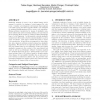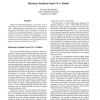25 search results - page 4 / 5 » Implicit context: easing software evolution and reuse |
MSR
2006
ACM
14 years 1 months ago
2006
ACM
Similarity analysis of source code is helpful during development to provide, for instance, better support for code reuse. Consider a development environment that analyzes code whi...
DATE
1999
IEEE
13 years 11 months ago
1999
IEEE
Software programming languages, such as C/C++, have been used as means for specifying hardware for quite a while. Different design methodologies have exploited the advantages of f...
LOBJET
2006
13 years 7 months ago
2006
Many object-oriented software applications contain implicit business rules. Although there exist many approaches that advocate the separation of rules, the rules' connections ...
ICSE
2003
IEEE-ACM
14 years 7 months ago
2003
IEEE-ACM
The knowledge required to develop complex software has historically existed in programming folklore, the heads of experienced developers, or buried deep in the code. These locatio...
LOBJET
2006
13 years 7 months ago
2006
ABSTRACT. Aspect-orientation promises better modularity than pure object-oriented decomposition. A typical benefit of increased modularity is ease of maintenance, evolution and reu...


